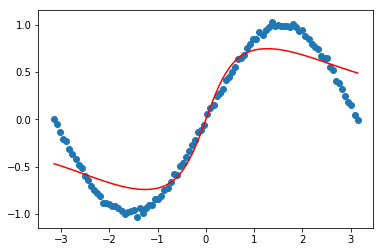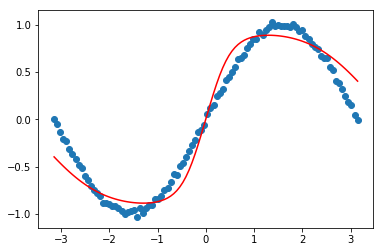import tensorflow as tf
import numpy as np
import matplotlib.pyplot as plt
# 这个 note book 演示了使用一个全联接前驱神经网络处理
# 来学习一个regression 的问题
x_data = np.linspace(-np.pi, np.pi, 100)[:, np.newaxis]
noise = np.random.normal(0, 0.02, x_data.shape)
y_data = np.sin(x_data) + noise
#输入神经元
x = tf.placeholder(tf.float32, [None, 1])
y = tf.placeholder(tf.float32, [None, 1])
# 1-N-1 full connectet network,
# activation function using tanh
#
# 隐含层的神经元个数
NUM_OF_HIDDEN = 20
# 激活函数类型
ACT_FUNC = tf.nn.tanh
#两层神经网络
W = tf.Variable(tf.random_normal([1, NUM_OF_HIDDEN]))
bias = tf.Variable(tf.zeros([1,NUM_OF_HIDDEN]))
z = ACT_FUNC(tf.matmul(x, W)+bias)
W_output = tf.Variable(tf.random_normal([NUM_OF_HIDDEN,1]))
bias_output = tf.Variable(tf.zeros([1,1]))
predict = ACT_FUNC(tf.matmul(z, W_output)+bias_output)
#损失函数
loss = tf.reduce_mean(tf.square(y-predict))
train = tf.train.GradientDescentOptimizer(0.1).minimize(loss)
with tf.Session() as sess:
sess.run(tf.global_variables_initializer())
for step in range(200):
sess.run(train, feed_dict={x: x_data, y:y_data})
prediction_value = sess.run(predict, feed_dict={x:x_data})
plt.figure()
plt.scatter(x_data, y_data)
plt.plot(x_data, prediction_value, 'r-')
plt.show()

with tf.Session() as sess:
NUM_OF_HIDDEN = 5
ACT_FUNC = tf.nn.sigmoid
sess.run(tf.global_variables_initializer())
for step in range(200):
sess.run(train, feed_dict={x: x_data, y:y_data})
prediction_value = sess.run(predict, feed_dict={x:x_data})
plt.figure()
plt.scatter(x_data, y_data)
plt.plot(x_data, prediction_value, 'r-')
plt.show()
